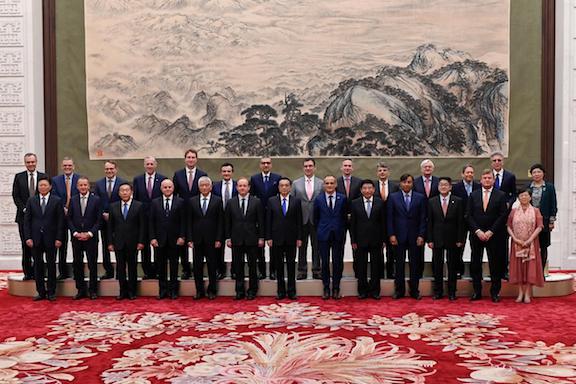A group of chief executive officers of American corporations are in Beijing this week to meet with China’s Premier Li Keqiang, as the simmering trade war ensnares companies from both countries.
The heads of chemical giant Dow Inc., United Parcel Service Inc., drugmaker Pfizer Inc., Hyatt Hotels Corp., property developer Prologis Inc and Honeywell International Inc., met with Li at Beijing’s Great Hall of the People—home to the nation’s legislature—on Thursday, according to a statement released by the Chinese government. Also at the meeting were 13 other global business leaders, including the heads of Volkswagen AG, Australian miner BHP Group, and Nokia OYJ.

At the meeting, Li promised to open up more sectors of China’s economy to foreign investment, noting that the firms in attendance had both contributed to China’s economic development and profited from the local market.
The premier also reminded the companies of the scale of China’s consumer market and in an oblique reference to the country’s dominant position in the production of many goods, asked them to consider the current uncertainties over trade from the perspective of the global industrial supply chain.
The CEOs are in the Chinese capital at a key moment, a week before Trump and China’s President Xi Jinping are set to meet on the sidelines of the Group of 20 summit in Japan. Trump said Tuesday that he had a “very good” phone conversation with Xi, and will hold an “extended meeting” with him in Osaka, triggering a rally in financial markets.
U.S. Trade Representative Robert Lighthizer said Wednesday he’ll speak with his Chinese counterpart, Vice Premier Liu He, this week to prepare for the meeting between the two countries’ presidents.
Company Risk
The company chieftains’ visit was scheduled ahead of time and isn’t necessarily a response to the tensions between the U.S. and China over trade, people familiar with the matter told Bloomberg ahead of the meeting. Speaking on behalf of the group—which had photos taken with Li afterward—Jean-Pascal Tricoire, chairman and CEO of France’s Schneider Electric SE, stressed the contribution the companies in the room made to China.
“We all employ and train people in China,” he said. “We all innovate in China.”
Becoming collateral damage in a geopolitical dispute is a perennial risk for foreign companies in the world’s second-largest economy. South Korean firms learned that in 2017, after their government agreed to allow the U.S. to deploy the Thaad missile-defense system—intended to safeguard against attacks by North Korea—over Chinese objections.
Korea, Canada
Brands from Hyundai Motor Co. to Amorepacific Corp. saw sales plunge amid boycotts, K-pop performances were canceled and retail conglomerate Lotte Shopping Co. was forced to largely wind down its Chinese business after allowing one of its golf courses to be used for the Thaad battery.
Apple and Nike Brace for China’s Wrath After Huawei Ban
Canada has been at odds with China since December, when its police arrested Meng Wanzhou, the chief financial officer of Huawei, in response to a U.S. extradition request. China subsequently detained two Canadians on spying allegations, prompting firms including Royal Bank of Canada to ask employees to avoid traveling there.
Some U.S. companies have started to explore alternatives to China. Alphabet Inc.’s Google is moving some production of Nest thermostats and server hardware out of China, avoiding punitive U.S. tariffs and an increasingly hostile government in Beijing, people familiar with the matter said this month. Others, including Mattel Corp. and several solar-panel makers moved some of their manufacturing to Mexico.










